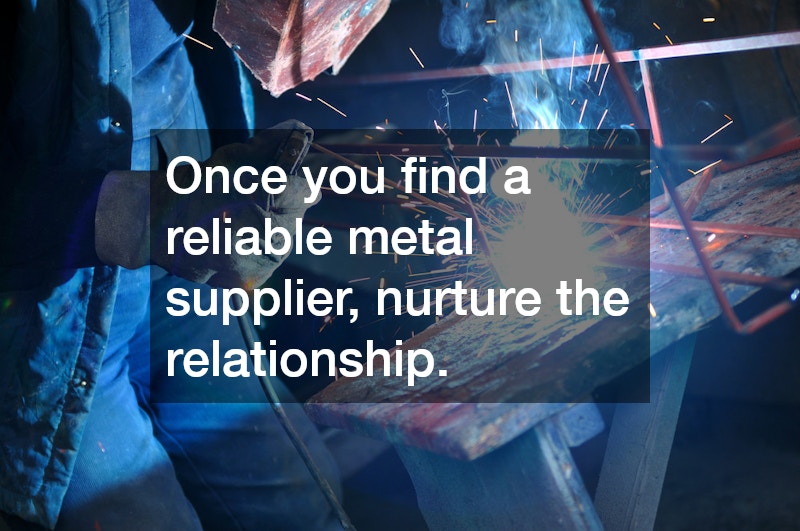
Choosing the right metal supplier is critical to the success of any construction, manufacturing or fabrication project. Without reliable material sourcing, even the best project plans can face costly delays, quality issues or compliance problems.
Whether you are starting a one-off build or managing ongoing industrial operations, the process of selecting a trusted supplier should be intentional, thorough and guided by a clear set of steps.
With a wide variety of metals, grades and suppliers available, it’s easy to feel overwhelmed by the choices. However, taking the time to evaluate potential partners carefully ensures your investment is protected, your timelines are met and your standards are upheld.
Understand Your Material Needs
The first step in sourcing metal is having a clear understanding of what you need. This includes knowing the type of metal required—such as steel, aluminium, copper or stainless steel—as well as the specifications like thickness, strength, finish and form. Are you looking for sheets, coils, tubes or custom profiles?
Understanding these details allows you to communicate effectively with potential suppliers and prevents costly misunderstandings. It also helps you determine whether a supplier can fulfil your requirements. If you are unsure about certain specifications, speaking with an experienced engineer or contractor can help clarify what materials best suit your project goals.
Research Local and National Options
Once you have a clear picture of your material needs, research potential suppliers. It can be tempting to jump at the first company that offers a competitive rate, but not all suppliers offer the same quality or level of service. Start with local providers, as they may offer advantages like faster delivery and better communication. National distributors can be considered if you’re working on larger-scale operations or seeking specific materials that are harder to source locally.
Check online reviews, ask for industry referrals and visit supplier websites to learn more about their product range, service area and reputation. Don’t hesitate to call and ask questions about stock availability, delivery options or technical support.
Verify Certifications and Industry Standards
A trusted metal supplier should comply with national and international quality standards. Certifications such as ISO 9001 indicate that the supplier follows consistent quality management practices. For structural steel and industrial projects, compliance with Australian Standards (AS/NZS) is a must.
Ask suppliers for documentation proving that their materials meet the required standards. This is particularly important if your project requires building approval or third-party inspections. Poor-quality or uncertified metals can compromise safety, performance and even lead to legal complications down the track.
Evaluate Customer Service and Responsiveness
Customer service can often be the deciding factor when comparing one metal supplier to another. A supplier who responds quickly to enquiries, offers knowledgeable advice and demonstrates a willingness to meet deadlines is worth their weight in gold.
Make a few initial calls or email enquiries to test how quickly the supplier gets back to you and how well they answer your questions. A trusted supplier won’t just try to close a sale—they’ll work to understand your goals and guide you toward the most suitable materials. If a supplier is slow to respond or gives vague answers, it could be a sign that they’re not as reliable when the pressure is on.
Compare Prices Without Compromising Quality
Price is always a factor, but it shouldn’t be the only one. The lowest quote isn’t always the best deal, especially if it comes at the expense of quality or reliability. Compare quotes from at least three suppliers, and be sure to ask what’s included. Some prices may exclude delivery or cutting fees, which can significantly affect the final cost.
Remember that a higher upfront cost might save you money in the long run by reducing waste, preventing rework and avoiding delays. If you’re unsure whether a quote is competitive, ask for a breakdown so you can compare line items like material cost, freight and handling.
Review Delivery Capabilities
A good metal supplier offers dependable delivery services that match your project’s schedule. Whether you need same-day dispatch or regular deliveries to multiple sites, the supplier’s logistics must align with your operations.
Ask about the supplier’s delivery coverage, cut-off times for orders and how they handle urgent requests. Also, find out how they package materials to prevent damage in transit. Poorly handled shipments can lead to delays and additional costs, especially if damaged items need replacing.
Build a Long-Term Relationship
Once you find a reliable metal supplier, nurture the relationship. Suppliers who know your business are better equipped to offer tailored solutions, priority service and proactive advice. They may even provide discounts or value-added services to loyal clients over time.
Make sure your feedback—positive or negative—is shared with the supplier. Open communication helps improve service levels and ensures your expectations continue to be met as your projects evolve.
Sourcing metal from a trusted metal supplier is more than a transactional decision—it’s a foundational part of any successful project. By understanding your needs, doing your research and evaluating suppliers based on more than just price, you put yourself in a stronger position to meet deadlines, stay on budget and maintain high standards.
Reliable supply chains are built on trust, communication and mutual respect. When you find a supplier who delivers on time, provides quality materials and supports your business goals, they become more than a vendor—they become a partner in your success. Choose wisely, and the benefits will carry through every beam, bracket and bolt of your build.




